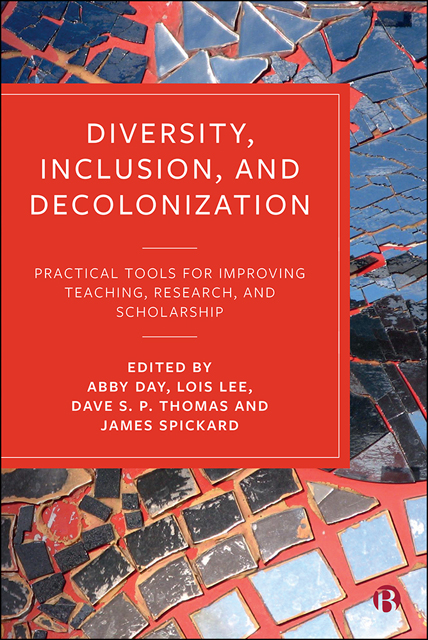 Diversity, Inclusion, and Decolonization
Diversity, Inclusion, and Decolonization Book contents
- Frontmatter
- Contents
- List of Figures and Tables
- Notes on Contributors
- Acknowledgements
- Typographical Note
- Introduction: Why Diversity, Inclusion, and Decolonization Matter
- Part I Changing Universities
- Part II Diversifying Curricula
- Part III Diversifying Research and Scholarship
- Part IV Overcoming Intellectual Colonialism
- Epilogue: What We Have Learned
- Index
14 - Opportunities and Challenges in Integrating Indigenous Peoples and Cultural Diversity in International Studies
Published online by Cambridge University Press: 13 October 2022
- Frontmatter
- Contents
- List of Figures and Tables
- Notes on Contributors
- Acknowledgements
- Typographical Note
- Introduction: Why Diversity, Inclusion, and Decolonization Matter
- Part I Changing Universities
- Part II Diversifying Curricula
- Part III Diversifying Research and Scholarship
- Part IV Overcoming Intellectual Colonialism
- Epilogue: What We Have Learned
- Index
Summary
Introduction
A major legacy of Spanish and American colonialism in the Philippines education system is the dominance of Western perspectives in teaching and research practices. Almost 100 years after the American departure, English is still used as the official language across all areas in Philippine society, local schools commonly adopt Western models in instruction and research, and Filipinos themselves generally prefer college degrees that offer international career prospects, most notably in nursing and international studies. In university settings, the most apparent impact of the dominance of the “global North” is the marginalization of academic fields and disciplines that focus on and emphasize the country’s ethnic diversity. It can be argued that this neglect in understanding the inherently diverse character of the Philippines has pushed its indigenous peoples (IPs) to the country’s impoverished peripheries.
Owing to its archipelagic geography, the Philippines is inherently culturally diverse, with more than 170 ethnolinguistic groups spread over more than 7,000 islands (Alvina et al, 2020, p 5). Remarkably, the country has retained this cultural diversity despite suffering multiple waves of colonial subjugation spanning more than three centuries. However, rather than being a source of national pride, the IPs in the Philippines are the most marginalized groups in the country. The continued exclusion and discrimination against ethnic minorities and the long history of their struggle for basic rights are among the most apparent markers of the colonial legacies in the Philippines.
“Minoritization” (Rodil, 1994) of IPs in the Philippines began with the Spanish colonial policy of distinguishing inhabitants in the islands between those who converted to Christianity and those who resisted conversion (Hardacker, 2012). The latter were referred to as infieles or pagans. These distinctions provided a convenient rationale for the “civilizing mission” of the later American colonial regime that took over the islands at the beginning of the 20th century. The Americans established the Bureau of Non-Christian Tribes, which purportedly sought to document the non-Christian inhabitants in the colony. In doing so, it perpetuated the racialized language of tribes that survives in Filipinos’ contemporary notions of civilizational hierarchy (Hau and Tinio, 2003). Unsurprisingly, it placed Christian Filipinos on top. Back then, Muslims and other non-Christians in the southern island Mindanao were even described as “uncivilized races” (Abinales and Amoroso, 2005, p 124).
- Type
- Chapter
- Information
- Diversity, Inclusion, and DecolonizationPractical Tools for Improving Teaching, Research, and Scholarship, pp. 220 - 235Publisher: Bristol University PressPrint publication year: 2022


